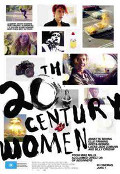
Directed by
Mike Mills
118 minutes
Rated M
Reviewed by
Bernard Hemingway

20th Century Women
Synopsis: Santa Barbara, 1979 and 55-year-old Dorothea Fields (Annette Bening) is a single mother struggling to relate to her15-year-old son Jamie (Lucas Jade Zumann). She recruits the help of the people she has around her, two tenants in her large house, laconic handyman/builder William (Billy Crudup) and Abbie, a young aspiring photographer (Greta Gerwig) recovering from cervical cancer, as well as Jamie’s best friend, Julie (Elle Fanning)
I was not overly taken with Mike Mills' previous film, Beginners (2010) and have not seen his debut, Thumbsucker (2005), but 20th Century Women is a gem of a film, deftly written by the director, rich with engaging characters and wry observations of their everyday lives all brought home with winning performances from the entire cast.
I’m not sure why the film is called 20th Century Women as it is very much about the specifics of modern life in the 1970s, a decade of of major transition when, in particular, feminism was mounting a radical assault on patriarchal mores and values of mainstream society and punk rock embodied hitherto unexplored modes of self-expression. Dorothea is somewhat adrift in these uncharted waters, too old for Flower Power (according to her son her attitudes can be explained by the fact that she "comes from the Depression") yet intelligent and open-minded enough to realize that her son's world will be heir to the future.
Dorothea is such a richly drawn character it is apparent that she must have been based on real life and indeed just as Beginners was about Mills' father so 20th Century Women is about his mother (which, needless to say, makes Jamie his alter ego). That doesn’t in any way diminish Mill’s achievement as a writer which is evident not just in his portrait of Dorothea but also in the way in which he weaves his characters into a tapestry of life that encompasses past, present and future.
In the lead Bening turns in a performance to love, given her centrality to the film’s success, possibly the best of her career. Chain-smoking, always in blouse, trousers and Birkenstocks, Dorothea is both vague and sharply aware, gregarious and private, candid and prim, as endearing a picture of (single) motherhood as we have ever seen on screen. The rest of the cast are of necessity less prominent but all are flawless contributors to Mills portrait of a moment in time.
Modest in scale but nonetheless ingeniously well-crafted 20th Century Women is a delight.

Want more about this film?


Want something different?




